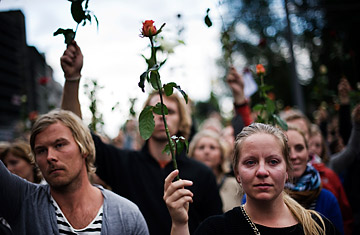
Thousands of people gather outside Oslo's city hall on July 25, 2011, in memory of the 76 victims of the July 22 attacks
(2 of 2)
Samstad seems typical of many of the city's residents, who hope demonstrations like the rose march can prevent a backlash against immigration and in favor of new security laws.
"We don't want to happen here what happened in the U.S. after 9/11," says Samstad. "We should be proud of our way of life, of our political views ... We are a rich country, and we should be willing to help others. I don't want immigration to become more restrictive because of this."
Debates over restricting immigration and increasing security had been under way even before the July 22 attacks. In a recent interview with TIME, Siv Jensen, head of the right-wing Progressive Party, Norway's second largest party — of which Breivik was briefly a member before abandoning it as too moderate — said she was not sure if Norway's police had the resources to respond to a serious threat and called for tighter restrictions on immigration. "We need to get the immigration policy under control. And then we need to be sure that police have enough resources to do their job," she said.
Jensen's criticism of police preparedness seems prescient considering that it took SWAT teams more than an hour to stop Breivik's rampage. They had to cross the lake to Utoya in boats because police have only one helicopter and it had been disabled that day. Even the police guarding the camp, where Labour Party leaders and Cabinet ministers were among the 600-plus guests, were powerless to stop Breivik because they were unarmed.
One officer who tried to stop Breivik, Trond Berntsen, stepbrother of the Norwegian crown princess, may have had an even chance of saving dozens of lives had he been issued a weapon. Instead, Breivik gunned down Berntsen like so many others. Now some are calling for giving the force better equipment and making firearms standard issue for every officer.
Responding to the criticism, police chief Johan Fredriksen said, "We would do it the same way again unless we were given more resources."
Near the fence in Oslo, an older man with a patchy gray goatee, visibly shaken, clutches his wife and stares at the scene. Gudmund Hernes, 70 years old, is a former Labour Party politician who held various Cabinet posts between 1980 and 1997 and now teaches sociology at Johns Hopkins University. Would Norway avoid the temptation to pass legislation similar to the Patriot Act and similar security laws passed in Europe after 9/11 despite promises not to cede civil liberties?
"I know I sound like a politician when I say it, but I really believe that this is not going to change us," Hernes says. "Yes, there will be some changes, some more security is necessary. But if you want proof that we are reclaiming our tradition of openness, tolerance and participatory democracy, just look at all these faces. You don't see hate here, profound sadness bordering on desperation perhaps, but also a commitment not to succumb to fear, not to hide, but to come out in the open."
It is too early to say whether Norway's culture of openness, the so-called Scandinavian exceptionalism, has been lost forever. One thing is for certain, though: residents of Oslo are unlikely to see the once familiar sight of the Prime Minister out for a stroll without bodyguards anytime soon.
